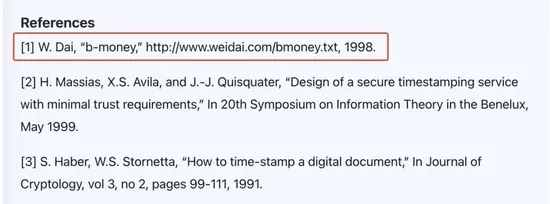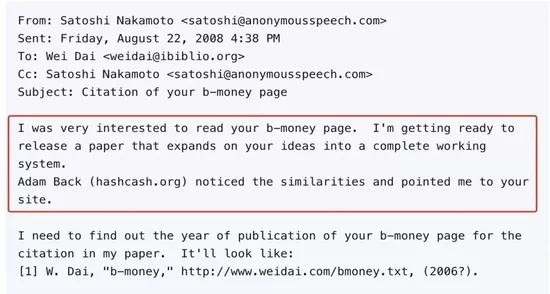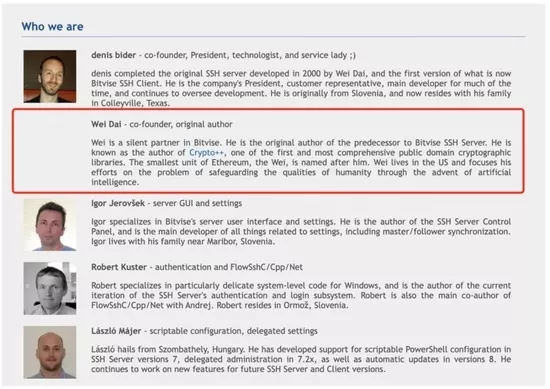In recent years, more and more Internet users have begun to migrate to Web3, trying to open up wasteland in this new continent and look for opportunities in the next era. The origin of all this can be traced back to the birth of "blockchain" technology 14 years ago. The decentralized and distributed network concept of blockchain is the cornerstone of the birth and development of various Web3 applications, and is also considered to be one of the most disruptive technologies in the 21st century.
Text /juny
As many people know, blockchain technology was proposed by a mysterious man named Nakamoto Cong. his paper entitled bitcoin: a point-to-point e-cash system published in 2008 marked the official birth of blockchain technology.
However, what many people do not know is that the underlying idea of blockchain was not first proposed by Nakamoto. As early as 10 years before the birth of bitcoin, a Chinese Cryptologist named weidai put it in his research called B-money.
In the process of writing bitcoin papers that year, Nakamoto wrote to weidai many times to discuss bitcoin, and made it clear that bitcoin is a supplement and extension to the B-money concept. Now, when you look at the bitcoin white paper, you will find that the first reference comes from the "B-money" released by weidai in 1998.

Image from bitcoin white paper
As an important pioneer of blockchain, weidai has always held a high position in the field of encryption and has influenced a large number of young people, including God v. But at the same time, weidai is also extremely mysterious in real life. At present, there are few personal data about him on the Internet, and there are different opinions about his story. Some people even suspect that weidai is actually Nakamoto Cong himself.
So, who is this Chinese cryptographer named weidai? This time we also tried to piece together one or two from various materials.
Important spiritual pioneer of blockchain
Before bitcoin, many basic technical concepts of blockchain actually came from cypherpunk, a mysterious mailing list organization established in 1993.
Cryptopunk is a "geek organization" that advocates the use of strong encryption algorithms to maintain personal privacy and security. Its members include many computer tycoons we are familiar with today, including Julian Assange, the founder of WikiLeaks, Tim Berners Lee, the father of the world wide web, Sean Parker, the original founder of Facebook, and of course, weidai and Nakamoto.
As early as the late 1990s, cryptopunk has produced many basic ideas and technologies that have a far-reaching impact on the blockchain in the future, including the pow algorithm invented by Adam Baker, the protocol using timestamp to ensure the security of digital files proposed by Stuart Haber and Scott stonetta, and the anonymous and distributed electronic cryptocurrency system proposed by weidai. Therefore, to some extent, blockchain technology is not the original invention of Nakamoto, but the integration of a series of technologies for cryptopunk groups.
Among them, the idea of B-money proposed by weidai can be said to be an important spiritual pioneer of blockchain.
The design of B-money is very similar to bitcoin in many key technical characteristics. It took the lead in putting forward the concept of distributed ledger, requiring all account holders to jointly determine the cost of computing volume and reach an agreement on it, and for the first time introduced concepts such as POW mechanism, digital signature, P2P transaction, smart contract and authentication.
However, as an incomplete idea, B-money at that time tasted a lot of content, and did not put forward detailed solutions in the consensus model, reward and punishment mechanism, currency creation and other aspects. Therefore, it just stayed at the design level and did not put it into practice, and did not cause great splash at that time.
Until 2008, Nakamoto started to design bitcoin based on various ideas of his predecessors. After finishing the writing, he first sent the article to Adam Baker, the inventor of pow algorithm. After reading it, Adam Baker found that the operating mechanism of bitcoin was similar to B-money proposed by weidai many years ago, so he suggested that Nakamoto should quote B-money. After carefully studying B-money, Nakamoto was surprised to find that weidai had almost the same idea as himself ten years ago. At the same time, he also learned from some mechanisms in B-money to improve bitcoin.
This story was recorded in several emails between Nakamoto and weidai. In these emails, Nakamoto told weidai that "bitcoin will expand your idea into a complete working mechanism" and "I think it has achieved almost all the goals you put forward in B-money".

Screenshot of Nakamoto and weidai's e-mail exchanges, picture from bitcoin com
After the advent of bitcoin, it has gradually caused greater and greater repercussions in the science and technology circle. As the first citation, B-money has again attracted a lot of attention. Weidai has also become a heavyweight blockchain pioneer in the eyes of many people.
However, weidai only modestly left a message in the forum discussion that although bitcoin has many similarities with B-money, it was completely created by Satoshi Nakamoto and has little to do with himself. Since then, he has gradually faded out of the network and rarely appeared in the public eye.
A mysterious cryptographic genius
Who is weidai? This question almost makes many people curious like "who is Nakamoto Cong?". Although we are in the Internet age of information explosion, there are still few news about weidai on the whole network.
First of all, some basically positive information is that weidai is a Chinese Cryptologist. He graduated from the University of Washington, majoring in computer science. He once worked for Microsoft. He is the co-founder of bitvise and the inventor of crypto++ open source library, which has an important influence in the field of cryptography.
Some say his Chinese name is David, others say it is Dai Wei. According to Wikipedia, he was born in 1976. If this information is true, that means he was only 22 when he proposed the B-money idea. At present, there is no official photo of weidai in the whole network. When searching for information, the silicon star people found that the photo previously used by many media as weidai himself was actually just another Chinese biology expert with the same name and surname.
It is pointed out that weidai joined Microsoft cryptography research group in Washington after graduation, and participated in the research, design and implementation of application encryption system. During this period, he registered two patents aimed at optimizing the encryption algorithm in the technology stack, which were later widely used in Microsoft software tools.
Later, he left Microsoft and participated in the creation of windows Bitvise, the strongest SSH client, is said to have written the first version of bitvise software. From the introduction of the founding team on bitvise's official website, we can also feel how low-key weidai is: not only is his photo blank, but also he is the company's "silent partner" in the introduction column.

Image cut from bitvise official website
According to another Jianghu rumor, weidai seems to be the son of Dai Xiwei, a former Chinese Microsoft executive. Who is Dai Xiwei? He was once the Chinese with the highest technical level in the American IT industry. The artificial intelligence company he founded was acquired by Microsoft in the 1980s and later transferred to Microsoft as a senior architect. When Bill Gates visited China for the first time, he was accompanied only by Dai Xiwei.
In the book "a man crossing the river" written by Dai Xi in 2003, he once mentioned his son Dai Wei. He said that he had shown great computer talent since childhood. At the age of 8, he could help his uncle write software to process laboratory data. At the age of 13, he began to write software himself. After high school, he practiced in the password research group of Microsoft Research Institute during the summer vacation. It seems that these backgrounds and tracks can match weidai.
In the circle, many people also speculate that weidai may be Nakamoto Cong himself.
Previously, some people have compared various texts published by Nakamoto with weidai's texts, and analyzed the similarity between weidai and Nakamoto from the perspective of language habits and word preferences, ranking second among all candidates. Some other evidences also include weidai and Nakamoto have a strong interest in philosophy, the bitcoin client is written in c++ that weidai is good at using, bitcoin uses a lot of the crypto library developed by weidai, both of them have some Oriental backgrounds and their status in real life is very mysterious, etc.

Picture from bitcoin com
Of course, the above are some guesses that have not yet been fully confirmed. Friends who are interested in this can conduct in-depth research by themselves.
He is far away from the Jianghu, but there is always a legend about him in the Jianghu
Now, when we search weidai, the most personal contact with him should be his personal home page full of "ancient flavor".
In this homepage, he recorded his research including crypto++ and his thinking on some technical issues. In addition, he also listed some communities he usually likes to visit, including less wrong, a "community blog to improve human rational art", and cypherchunks mentioned earlier. However, this personal homepage has not been updated for a long time. Weidai has not appeared on these forums for several years.
Although weidai is not in today's bustling Web3 Jianghu, later blockchain pioneers always remember this pioneer.
For example, the smallest unit of Ethereum is named Wei. An Ethereum = 10 to the power of 18 Wei, and this Wei is derived from weidai's name. For another example, Dai, the world's fourth largest stable currency, has adopted weidai's surname as an important source of its name. From this, it is not difficult to see that weidai plays an important role in the field of encryption.

The origin of Wei's company name. The picture is taken from Investopedia
In fact, like weidai, "mystery" is a common feature of many pioneers in the field of encryption. When more and more Web3 business applications appear, and more and more latecomers become famous, most of these pioneers choose to retreat in the Jianghu.
Establishing an absolutely secure system for personal information and realizing privacy freedom were the starting points for cypherpunk to start encryption research, and these old geeks seem to be adhering to this spirit.
It may not be so important who weidai and Nakamoto are. What is important is that their efforts and research in pursuit of an ideal Utopia more than 20 years ago have opened the door to the next era.